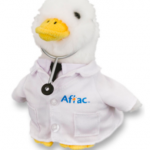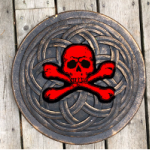Things pretty much suck. Three states are on fire. There are five tropical cyclones in the Atlantic for the first time ever. Our social fabric is hardly intact. And there is this annoying little virus blowing up people's lungs -- and it isn't going away anytime soon. But, thanks to the CPSC at least we can sleep at night. Dr. Duck's lead buttons will threaten us no more.
lead poisoning
Right now pretty much everything sucks. It can get mighty depressing, reading about COVID-19 deaths or civil unrest. So let's have some fun! A few minutes of mindless idiocy at the expense of California. Why now? Because their officials decided that my patio umbrella stand is gonna give me cancer. There's even a label to prove it. And if you act now, you'll get some really bad "artwork!"
A recently published working paper states that the water in Flint, Michigan is presumably responsible for startling drops in fertility rates, and increased fetal deaths, as compared to neighboring cities. How reliable are these data and should we really be sounding alarm bells?
Lost in the political infighting tied to the Flint, Michigan water crisis is that lead levels in kids and adults are far, far lower than they have ever been. To that point, a report from a national newspaper highlights that, "after years of progress, context-free panic over events in Flint is counterproductive."
EXECUTIVE SUMMARY
Despite years of intensive research, educational efforts, and remedial measures, lead continues to receive as much attention as any modern environmental health risk. Some would still characterize lead as America's leading environmental health concern. Based on a review of the scientific literature, and assessing lead from the perspective of public health, American Council on Science and Health (ACSH) has come to the conclusions stated below.
First edition, December 1997; reprinted August 1998; second edition, July 2000
- - - - - - - - - - - - - - - - - - - - - - - - - - - - - -
EXECUTIVE SUMMARY Despite years of intensive research, educational efforts, and remedial measures, lead continues to receive as much attention as any modern environmental health risk. Some would still characterize lead as America's leading environmental health concern. Based on a review of the scientific literature, and assessing lead from the perspective of public health, American Council on Science and Health (ACSH) has come to the conclusions stated below.
New York, NY July 1998. In a statement released in June 1998 the New York Public Interest Research Group (NYPIRG) reported that 9,000 children in New York City have tested positive for lead poisoning.
New York, NY February 1998. In a new report, New York City Public Advocate Mark Green has called lead poisoning a "dire problem" for the city's children. The New York City Advisory Council on Health Priorities, an affiliate of the American Council on Science and Health (ACSH), has concluded, however, that for the majority of New York's children lead poisoning is a thing of the past. Mr. Green's proposal that the city enact legislation requiring landlords to conduct annual inspections of all apartments housing children under six regardless of the existence of lead paint (and therefore lead exposure) in the dwelling is thus a call for an unnecessary and wasteful piece of legislation that is not grounded in either science or common sense.
Lead poisoning is often cited as the number one environmental health concern for children. A panel of physicians and scientists affiliated with the American Council on Science and Health (ACSH) has concluded, however, that for the majority of American children, lead poisoning is a condition of the past.


